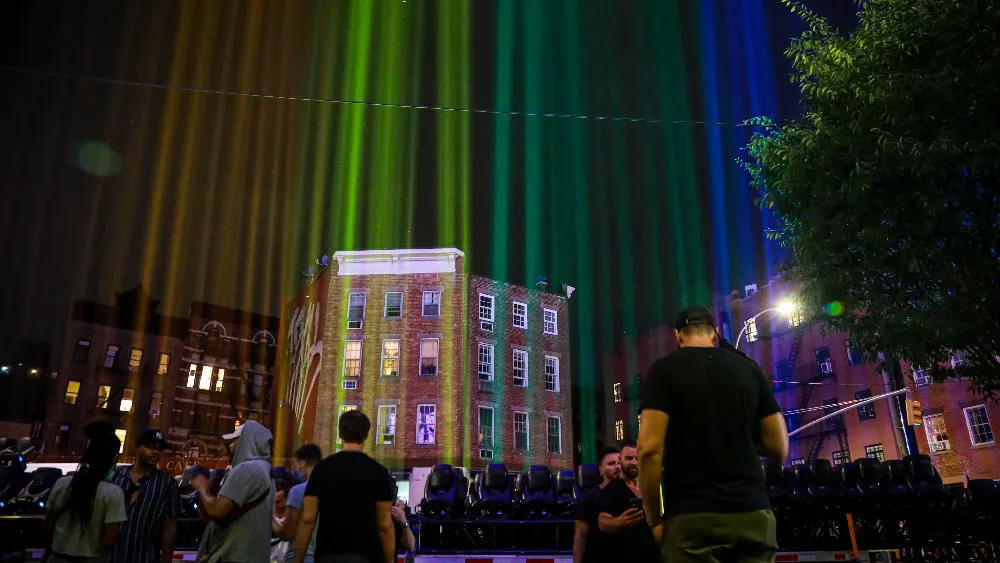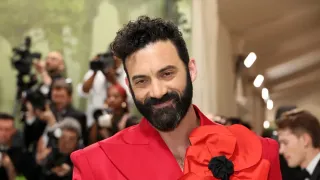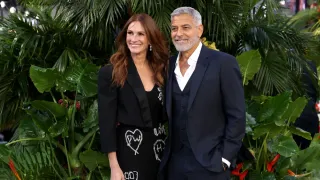April 18, 2014
Andy of Gayberry? 'Tennessee Queer' Explores Rural Gay Life
Kevin Langson READ TIME: 9 MIN.
Gay. Presbyterian deacon. Filmmaker. These aren't three identities one usually finds in a single individual. So, Mark Goshorn Jones has something unique to bring to the LGBT film festival circuit, as well as to the effort to make socially meaningful cinema in America. Jones is also a proud Southerner largely influenced by his upbringing and community involvement in Memphis; he also succeeds at working locally. Like his romantic comedy, "Eli Parker is Getting Married?" -- another collaboration with fellow Memphis artist Ryan Parker -- his third film was set and shot in the Southern city.
"Tennessee Queer", the film Jones wrote, produced and co-directed with Ryan Parker, is in limited release around the country; and it's proof that his hopeful and accessible manner of tackling the tough matters of growing up gay in an unaccepting environment make him a voice worth listening to. Just before "Tennessee Queer" played the Texas Theater in Dallas on March 31, Jones took a few minutes to discuss his work. The film plays next at the Plaza Theatre Atlanta, from April 18th-24th. Filmmaker Q & A's follow the screenings on the 18th and 19th. (For more information, visit the film's website
The religious factor
EDGE: Just as being Black in the American South has had a very specific resonance, being a Southern gay has its culturally-specific implications. There are complications with being either anywhere in America, but, as a product of the South, I understand how entrenched certain prejudices are in the regional culture. How has being a Southern gay man shaped your artistic interests and what you wish to communicate?
Mark Jones: As a gay man who grew up in the South, I have heard ministers and politicians say very hateful things about members of the LGBT community. Yes, most of that occurred in the '70s, '80s and '90s, but even in the past five years, I've seen ministers and local politicians hold press conferences and preach against gays and try to rally against any sort of legal protection for LGBT city or county workers.
Memphis is a religious city and conservative ministers have influence over local politicians. At least that's how it seems to me. I would say Memphis city government is probably 10 years behind other city governments in regards to respect to LGBT workers and citizens. I created the characters of Dewayne Cotton and Preacher Joe Barns in the movie to show how the relationship still exists in the South between conservative minister and conservative city councilman.
EDGE: Also, I can relate to the ambivalence that is present in the film. I mean that there is love for home and for certain qualities of the South, such as the congeniality and unpretentiousness of the people, at the same time that there is disgust at the resistance to progress and the contempt for difference. In what ways is the South close to your heart? What do you want this film to communicate about the South and about gays who came out of the South?
Mark Jones: I'm from the Memphis and have lived in some small towns such as Darlington, SC and Greenville, MS. I also went to college in a small town -- Presbyterian College in Clinton, SC. So, I feel like I know the South. Religion plays a big part in the lives of Southerners. You've got four ministers in the film, although only two are more major characters. Family is also another big thing about the South. 'Going home to see the family.' Perhaps evens mothers are bit more crazy in the south as the one in the film is.
The sad thing is, lots of gay men come out and then leave the south never to return. Or if they do return it's only for a short visit, like the character in the movie -- a weekend once every couple of years. And that makes it hard for the LGBT kids in the small town. Not a lot of role models are in the towns.
Why comedy?
EDGE: Can you tell me something about your interest in this kind of comedy? Why explore these themes through comedy rather than drama?
Mark Jones: Basically, I'm better at writing comedy than I am drama. There is some drama in the film, but it is really a comedy. I also think people don't want to be hit over the head with a heavy drama or preached at, so a comedy is better vehicle to get the point across that LGBT teenagers and adults as well still need help and support in small town America.
EDGE: How did the casting go? Was it important for your male leads to understand what it's like to be a Southern gay man?
Mark Jones: This is my third movie to make and I've made a web soap opera as well. Several people in 'Tennessee Queer' have worked on at least one of my other projects and a couple of people have worked on all four. I did use a local casting agency in finding some actors and talked with friends for recommendations. The two leads are film actors, but several of the key supporting actors are part of local theater community.
Billie Worley was always my first choice to play Dewayne Cotton. Billie is a great actor, and I knew he could play the part with relish. I looked at a few local actors to play Jason Potts, but decided on Christian Walker. Christian is a straight man, but wanted to expand his acting skills and play a gay man. I think he did a wonderful job. Christian has told me that as a teenager, he was into music and bands that were not popular at his high school and he was left out and not included in a lot of popular activities, so he somewhat understood what it meant to be living outside the norm during high school. He and I spoke about being gay in the south. Christian also has many gay friends.
Navigating identities
EDGE: The convergence of religiosity and gay identity has been something of a hot topic for a while. For you, what is the most difficult thing about navigating both of those identities? And what is the most rewarding?
Mark Jones: I hear a lot of misunderstanding and/or suspicion on both sides. There are more and more mainline churches in Memphis that are not only accepting of LGBT members, but are putting LGBT church members in leadership roles. Some of the mainline churches have LGBT church groups. My church has an active LGBT group. For the past three years the group has marched in the Memphis Pride Parade and last year the group sponsored a movie at the Outflix Film Festival.
I guess what bothers me the most is that there are still many many churches in Memphis and the surrounding area that still preach against gays, that say hurtful and untrue things and the preachers try to influence the elected leaders to go against the LGBT community.
EDGE: As a religious leader, what frustrates you the most, in regards to cultural attitudes towards religion and homosexuality? What were you trying to convey about the subject in making this film?
Mark Jones: One of the major things I was trying to convey with this film is that one person can make a very positive difference in the lives of LGBT youth. Along with that, a small group can do great things. And, you don't have to go to NY or LA or SF or some other major city to make a big difference. It can be done in your old hometown in the south.
Working in Memphis
EDGE: You mention seeing Ira Sachs's 'The Delta,' an understated Southern drama about a teenage boy who bonds with a Vietnamese-American man, when you first came out. What did you take from that seminal gay film that stuck with you? What do you hope sticks with young people watching your films?
Mark Jones: I saw Ira's film back in the '90s at a PFLAG meeting in Memphis. I guess what moved me the most was that a gay film could be made in Memphis. That seemed impossible to me, but Ira's film gave me hope that you can tell a story in Memphis with gay characters. I shot my first film, 'Eli Parker Is Getting Married?,' about four years after seeing 'The Delta.'
I hope that young people see that there is hope out there for them, that being gay in small town is OK. I'd like for adults to know that there is still major work to be done in small town America.
EDGE: You have also served on the Pride Parade Committee in Memphis, as well as being a leader in the Outflix Film Festival in the city. How has the reception in Memphis been to the LGBT film festival? Are there any other gay directors whose films you are inspired by these days?
Mark Jones: The Outflix Film Festival will be celebrating its 17th year in September. Some of the early years were up and down and somewhere around year 5 or 6 the festival was revamped a bit and expanded. The festival has traveled around a bit from one location to another over the years, but this will be the 7th year at its current location. And it's the nicest theater in town. Last year there were several sell outs over the 7 nights of movies.
I enjoy movies by Rob Williams, Casper Andreas, Morgan Fox and Robert Camina. I know Robert is working on a new documentary, 'Upstairs Inferno,' and I look forward to seeing that when It's done.
EDGE: Do you have plans for a next project you want to mention?
Mark Jones: I've been working on some short films and might shoot a few this summer.
For more information about "Tennessee Queer" and to find out about upcoming screenings, For more information, visit the film's website







